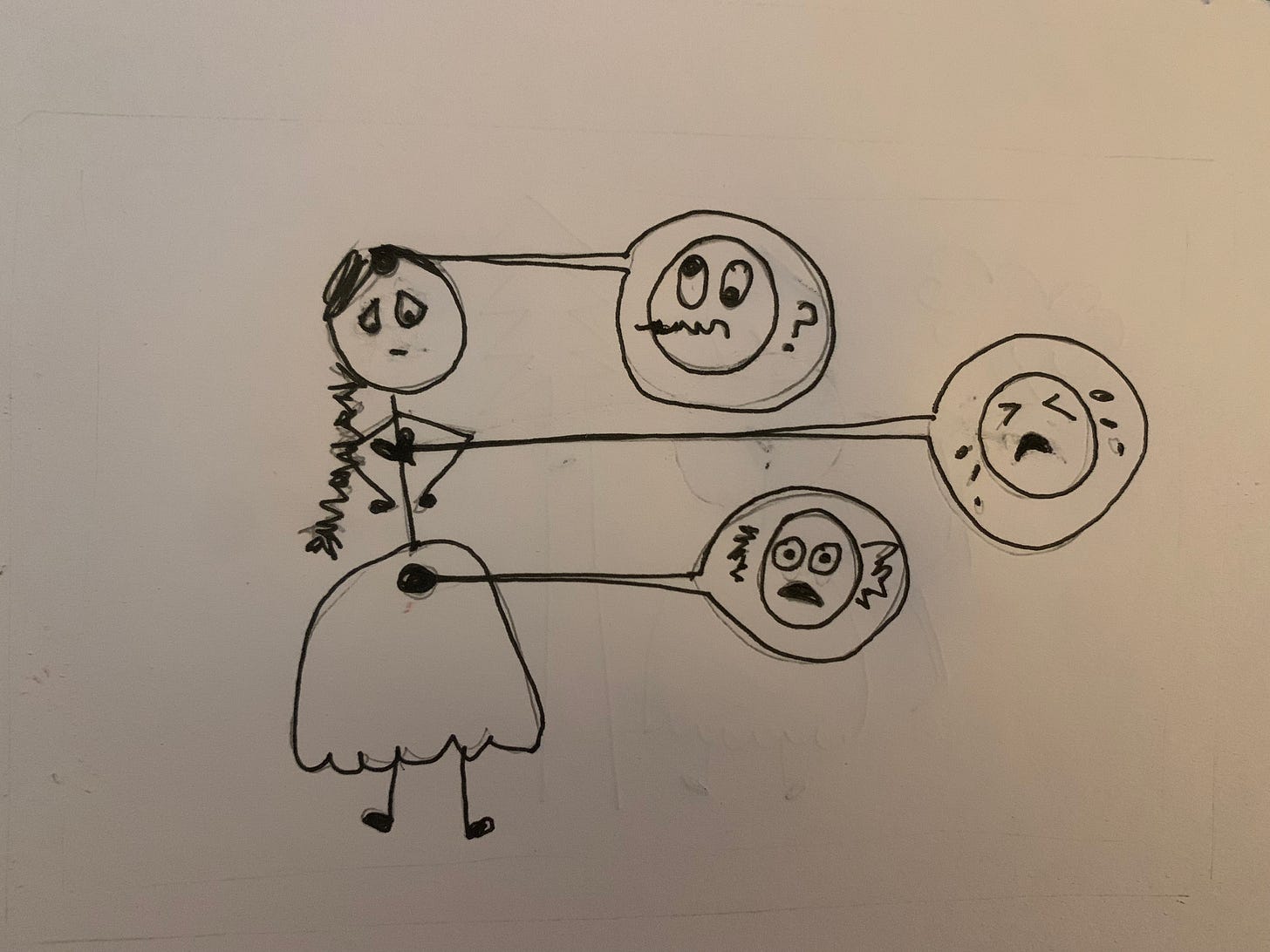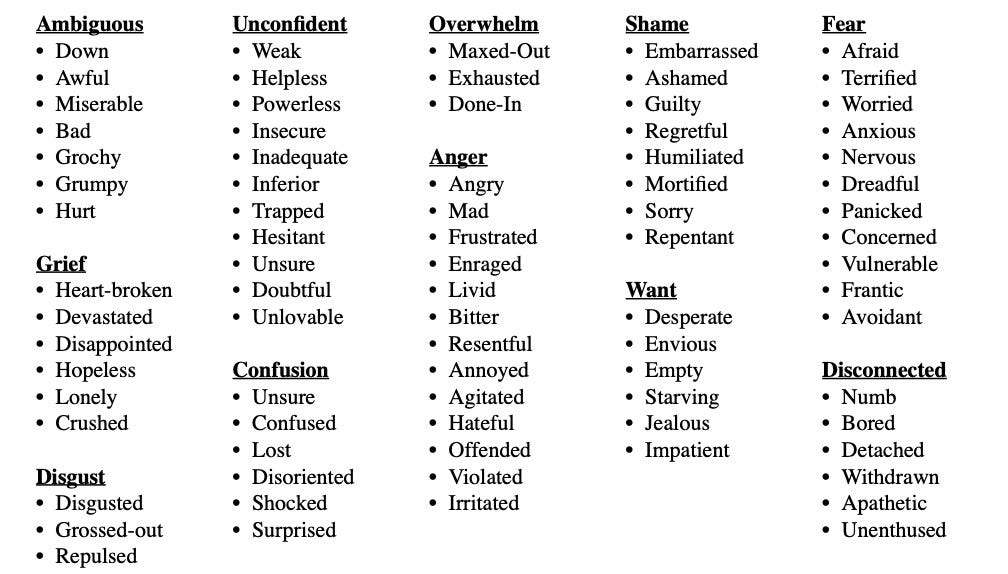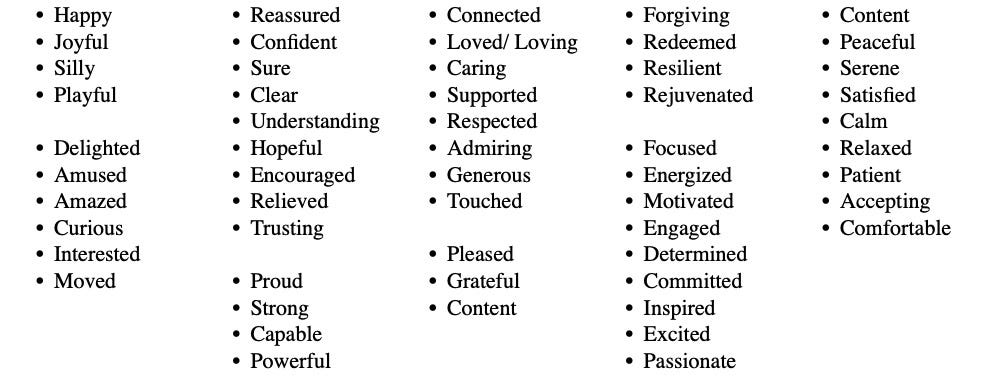In This Wonderful World, one of the most loving things I can do for myself is to honestly feel my emotions. However, this is not always easy to do. Emotions can be complex and uncomfortable, and they don’t always fit my ideal image of myself. Plus, I haven’t always had the tools or skills to identify, endure, or value them.
But, after years of big feelings and inner-inquiry, I’ve found gifts in my emotions: they always facilitate greater understanding and love for (our) nature; they may not “fix” circumstances, but as I embrace my emotions with care and curiosity, they facilitate infinite levels of peace. How they do that is a lifelong discovery that starts (simply) with recognizing how I feel, and caring about where those feeling come from. From there, my emotions blossom into love, peace and wisdom.
What that in mind, here’s some of the ways I build a caring emotional relationship with myself (and, by extension, with others):
Emotional Vocabulary
One of the great gifts of reflective arts is that it facilitates the blossoming of emotions into love, peace and wisdom. Metaphors, stories, and music support us in discovering the gifts of our feelings with fullness.
That being said, when building an emotional connection with myself, it helps to start with a basic emotional vocabulary. Here’s a couple lists to get started. I simply start with the sentence “I feel” and see which word(s) fit best from this list. When I’m feeling overwhelmed, it really does help to look for words to describe my feelings.
Uncomfortable Emotions
Feel-Good Emotions
Uncovering Hidden Feelings
Sometimes (or often) there are feelings that I deny or hide from myself. Some indicators of hidden feelings might be: addiction, avoiding quiet time alone, depression, lack of motivation/chronic fatigue, anxiety, difficulties with anger management, chronic illness or pain, insomnia, strained relationships, and/or regular conflict.
That being said, denial or avoidance of our feelings is not a character flaw; it’s an understandable and common response to feeling overwhelmed, confused, helpless, or repressed. What that in mind, the first step to uncovering hidden emotions is to compassionately understand why I’m avoiding them. Here’s some
Common causes for emotional denial or avoidance:
Overwhelmed Feelings: These are feelings that seem like too much to handle. Perhaps the feeling is so intense that it seems like it will consume or destroy me. Or, perhaps there are so many different emotions happening at once that they simply can’t all be addressed at the same time.
I Ask: What’s too overwhelming for me to feel right now? Why?
Contradicting Feelings: These are feelings that get hidden because they don’t make sense with the other feelings I’m having. For example, perhaps I’m grateful but also mad, or frustrated but also relieved.
I Ask: What’s confusing for me to feel right now? Why?
Helpless Feelings: These are feelings that come from situations where I feel helpless. Sometimes this helplessness is real (such as the loss of a loved one or any difficult situation that’s outside my control). Sometimes it’s rooted in a genuine lack of skill, understanding or confidence. Still, sometimes this helplessness is rooted in trauma that has led me to believe that I am more helpless than I actually am. In any case, simply recognizing a feeling of helplessness is a helpful start.
I look at the list of Uncomfortable Emotions (above). I note which ones feel too big, scary or too hard to handle.
I ask: What am I scared to feel right now? or What am I feeling powerless to right now? Why?
Forbidden Feelings: These are feelings that we don’t think we should have. Perhaps they don’t fit my ideal image of myself. Perhaps they don’t fit my family’s or my culture’s ideal of what a healthy or successful person “should” feel. For example, I come from a culture where feel-good emotions are associated with being a successful person while uncomfortable emotions are associated with being a failure.
I look at both lists of Emotions (above). I notice which ones I would feel embarrassed or ashamed to feel (note that both positive or negative emotions can be forbidden).
I ask: What am I embarrassed/ashamed to feel right now? Why?
Cover-Up Feelings
Depending on our culture, our family system, or our individual experiences, we may feel more comfortable with some emotions than others. For that reason, sometimes I hide the feelings that I’m uncomfortable with under the feelings that I’m most comfortable with. Though this disguise can happen in many different ways, here’s some common things I look for:
Under Anger and/or Frustration I ask “What about this scares me? What about this hurt me? What about this saddens me?”
Under Sadness and/or Depression I ask “What about this scares me? What about this angers me? How am I feeling unconfident?:
Under Anxiety and/or Worry I ask “What about this hurt me? Where do I feel weak/incapable? How might I be feeling mad?”
Under Embarrassment and/or Self-Hate I ask “What about this confused me? What about this hurt me? What about this saddened me? What about this angers me?”
Under Exhaustion and/or Numbness I ask “What about this overwhelms me? What about this makes me feel powerless or hopeless?”
In the process of sitting with my emotions and tracking them to their root, I’ve found that they’ve all lead to me to the same painful place of loss. As care and responsibility require us to attach ourselves to things and people, the inevitability of loss hurts every time. For that reason, the practice of embracing my emotions is inextricably linked to the practice of embracing loss. It starts with compassion: It is scary to imagine losing what we love. It does hurt to lose what we care about. Then, from that that tender place of my own human suffering, there is a blossoming of creativity that’s able to find love and meaning to soothe and overcome the pain.
Emotional Affirmations
When digging up difficult emotions and feelings, here’s some helpful affirmations that I’ve found support the process. That being said, these affirmations don’t always feel true in every circumstance. If any of these affirmations ever feel untrue, then exploring what’s making them feel untrue can offer extremely helpful insight into where I’m needing the most support.
Self-Compassion
I say: “It makes sense that I feel this way. It’s normal for humans to feel this way in this kind of circumstance.”
Embracing Difficultly
I say: “I accept this feeling as part of the human condition. I trust the gifts of strength, wisdom, and compassion that it brings to me.”
Emotional Endurance
I say: “I am capable of experiencing this feeling. I am capable of enduring this feeling. I will survive it.”
Emotional Trust
I say: “I recognize that this emotion is facilitating a blossoming in my life. I trust my ability to bloom beautifully.”







